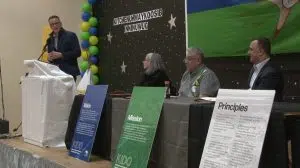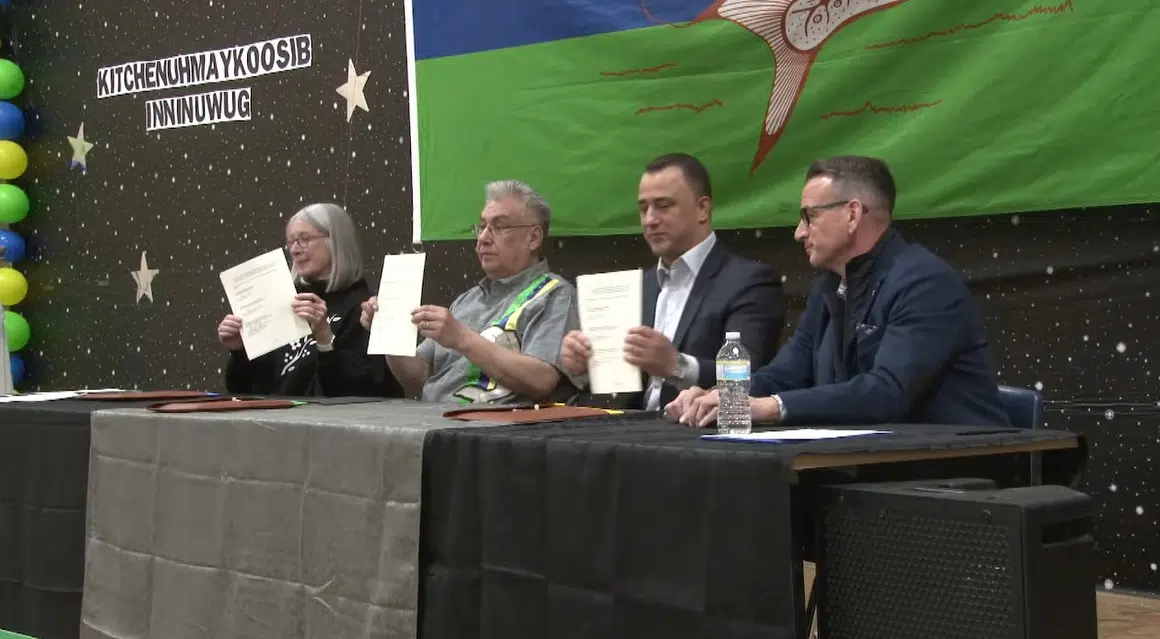The ink is drying on a historic trilateral deal between the governments of Canada and Ontario and the Nation of Kitchenuhmaykoosib Inninuwug, which will bring child and family services back under the control of the community, under and agreement called Kitchenuhmaykoosib Inninuwug Dibenjikewin Onaakonikewin or KIDO.
Chief Donny Morris says for the community to be successful it can no longer look at the past and place blame upon former policies.
“We’re going to be moving forward, and moving forward means everybody has to play a role. Chief and Council, families, organizations, everybody, each and every one of us will come together.”
Morris was joined by Indigenous Services Minister Patty Hajdu, newly minted Ontario Children, Community and Social Services Minister Michael Parsa, who signed the agreement Tuesday, along with Ontario’s Indigenous Affairs Minister Greg Rickford and Deputy Ontario NDP Leader Sol Mamakwa.
Parsa calls the agreement, which is also the first of its kind in Treaty 9 territory, a testament to the community’s commitment to developing a law that places safety and security at the forefront, while also addressing unique needs.
“Ontario is pleased to be part of this collaborative process to ensure that KI’s treasured values, customs, languages, and spiritual teachings are deeply integrated into their child and family services.”
The agreement has been over a decade and a half in the making, with the first drafts being written in 2007.
In her remarks Hajdu noted the difficulties with the fractured relationship between First Nations and Canada and the challenges with healing.
“One Elder said an ‘abusive’ relationship, of course it takes time to heal. But when we tangibly put in to place the laws like the one today, that will be signed, combined with equity and funding and true partnerships with provinces like Ontario…that’s when the healing begins.”
Additionally Kitchenuhmaykoosib Inninuwug and Canada have entered into a fiscal relationship which will provide $93.8 million over four years to support the community in implementing its law and service delivery model, and negotiations are also underway for a funding agreement between the community and Ontario.
Rickford echoed Hajdu on the partnership between the two levels of government, noting the rarity of the agreement, which marks real leadership for all parties involved.
“This is the second agreement we have signed over the last five years, and there are only seven of its kind across the country…its a tremendous accomplishment.”
The announcement also had a special place for Mamakwa, who also represents the Kiiwetinoong riding in Queen’s Park who spoke on colonialism, the impacts and the systems that were created that constricted and limited First Nations from being able to look after their children and families, calling KIDO a document of freedom.
“So this is a celebration to be able to start the process and the path towards being better, a good future, a sense of hope for the children…the youth that are here.”
KIDO officially came into effect on April 1st.

Indigenous Affairs Minister Greg Rickford speaks during a signing ceremony in Kitchenuhmaykoosib Inninuwug along side Indigenous Services Minister Patty Hajdu, Chief Donny Morris, and Children, Community and Social Services Minister Michael Parsa
Photo Submitted




